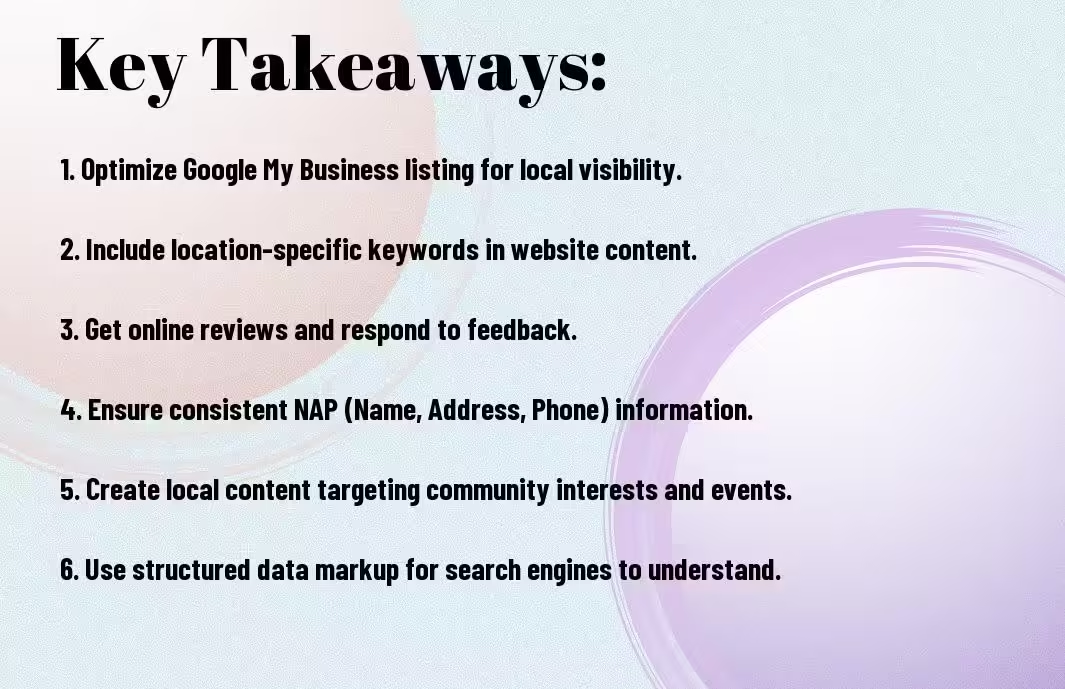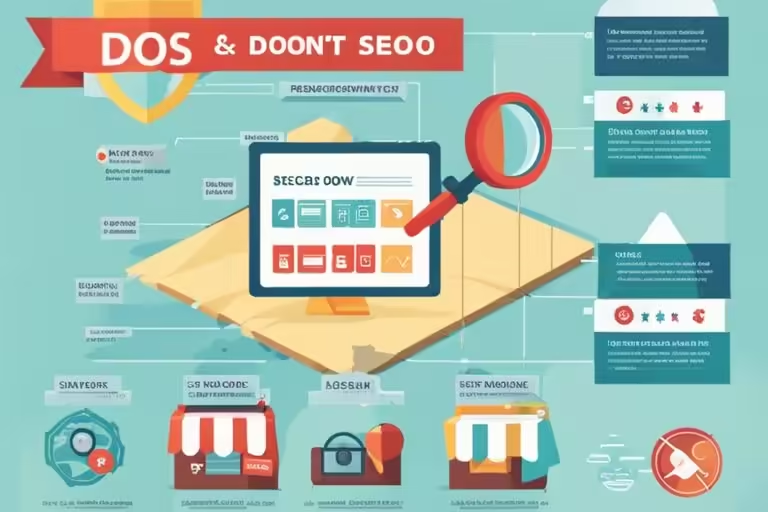Overwhelmed by the complexity of local SEO? Don’t worry, you are not alone in the digital marketing world. Mastering the art of local SEO can significantly impact your online visibility and business growth. In this guide, we will walk you through the vital dos and don’ts of local SEO to help you navigate the ever-changing landscape of search engine optimization. Let’s dive in and discover how to optimize your website for local search success!
Key Takeaways:
- Claim your Google My Business listing: This is vital for improving your local search visibility.
- Use targeted keywords: Incorporate location-based keywords in your website content and metadata.
- Optimize for mobile: Make sure your website is mobile-friendly to cater to local searchers on-the-go.
- Get local backlinks: Build relationships with local businesses to get quality backlinks to your site.
- Encourage customer reviews: Positive reviews on Google My Business can boost your local SEO rankings.

The Dos of Local SEO
Claim and Optimize Your Google My Business Listing
Business – One of the first steps you should take in optimizing your local SEO is to claim and optimize your Google My Business listing. This is crucial because it is often the first thing that potential customers see when they search for businesses like yours. Make sure to provide accurate and up-to-date information, including your business name, address, phone number, and website. **Optimizing** your GMB listing can help improve your visibility in local search results.
Use Location-Specific Keywords in Your Content
Keywords – Incorporating location-specific keywords into your website content is necessary for improving your local SEO. When **people** search for products or services in your area, these keywords will help your website appear in relevant search results. **Including** the name of your city or region in your content can make a significant difference in your local search ranking.
A – Additionally, **creating** location-specific landing pages can further boost your local SEO efforts. These pages can target specific areas you serve and can help attract more local customers to your business.
Build High-Quality Local Citations
Content – **Building** high-quality local citations on reputable online directories can improve your visibility in local search results. Make sure that your business name, address, and phone number (NAP) are consistent across all these citations. This consistency can **signal** to search engines that your business is legitimate and trustworthy.
Your – Focus on getting listed on industry-specific directories, local chambers of commerce, and review sites to enhance your local SEO efforts. **Quality** citations from authoritative sources can help establish your business’s credibility and improve your search engine rankings.
Leverage Online Reviews and Ratings
LocationSpecific – **Listing** – Encouraging your satisfied customers to leave positive reviews and ratings online can significantly impact your local SEO. Search engines consider online reviews as a trust signal, and businesses with a high volume of positive reviews are likely to rank higher in local search results. Responding to reviews, both positive and negative, shows **that** you value customer feedback and can help build trust with potential customers.
Don’ts of Local SEO
Avoid Duplicate or Inconsistent Business Listings
After setting up your business listings on various online directories, such as Google My Business, Yelp, and Yellow Pages, avoid creating duplicate listings or inconsistent information. Business directories use this information to verify your business’s legitimacy and rank it in local search results. Having multiple listings or conflicting details can confuse search engines and potential customers, ultimately harming your local SEO efforts.
Don’t Over-Optimize Your Website with Keywords
Keywords are vital for local SEO, but overusing them on your website can have negative consequences. Don’t stuff your content with keywords in an attempt to rank higher. This can make your website appear spammy to both users and search engines, leading to penalties and a drop in rankings.
Furthermore, search engines are now prioritizing user experience and natural language, so focus on creating quality content that incorporates keywords in a relevant and organic manner.
Refrain from Using Fake or Paid Reviews
Using fake or paid reviews to boost your business’s reputation may seem tempting, but it’s a risky tactic that can backfire. Search engines and consumers are becoming increasingly savvy at detecting fake reviews, and if caught, your business could face severe consequences.
Inconsistent or inauthentic reviews can damage your credibility and trustworthiness, which are crucial factors in local SEO. Instead, focus on providing excellent products or services that naturally generate positive reviews from satisfied customers.
Don’t Ignore Mobile Optimization
For local businesses, ignoring mobile optimization is a major mistake in today’s digital landscape. With more people using smartphones to search for local businesses, having a mobile-friendly website is crucial for attracting and engaging potential customers.
A responsive design that adapts to different screen sizes and fast loading times are key factors in mobile optimization. Ignoring mobile usability can result in a poor user experience and lower rankings in mobile search results.

Optimizing Your Website for Local Search
Use Location-Specific Meta Tags and Titles
Not utilizing location-specific meta tags and titles on your website can be a missed opportunity to improve your local SEO. By including your city, state, or region in these elements, you signal to search engines that your business is relevant to local searches.
Create Content Relevant to Your Local Audience
To attract local customers, it’s crucial to create content that speaks directly to them. Incorporate local events, news, and concerns into your blog posts or service pages to show that you understand and cater to the needs of your community.
Create a connection with your audience by addressing their specific interests and challenges. This will not only boost your local SEO but also help in building a loyal customer base who sees your business as part of their community.
Ensure Fast Page Loading Speeds
Optimizing your website for fast page loading speeds is imperative for local SEO success. Slow websites can result in higher bounce rates and lower search engine rankings, impacting your visibility to potential customers in your area.
Make Your Website Mobile-Friendly
With the increasing use of mobile devices, it’s crucial to ensure that your website is mobile-friendly. A responsive design that adapts to different screen sizes not only enhances user experience but also pleases search engines, improving your local search rankings.
Make sure your website is easy to navigate on smartphones and tablets, with buttons and links that are easily clickable. By prioritizing mobile-friendliness, you can better reach and engage with local customers who are searching for products or services on their mobile devices.
Building Local Authority and Trust
For a successful local SEO strategy, it’s necessary to build local authority and trust. By establishing your credibility within your community, you can improve your online visibility and attract more local customers.
Partner with Local Businesses and Organizations
Local partnerships can significantly impact your local SEO efforts. Partnering with other reputable local businesses and organizations can help you build strong backlinks, increase your online presence, and boost your credibility in the eyes of search engines.
Create High-Quality, Locally-Relevant Content
Local content that is relevant to your community can help you establish authority and trust among local customers. By creating high-quality content that addresses the needs and interests of your local audience, you can improve your search engine rankings and attract more local traffic to your website.
With locally-relevant content, you can showcase your expertise in your industry while demonstrating your understanding of the local market. This can help you build trust with your audience and position your business as a valuable resource in the community.
Engage with Your Local Community Online
One of the most effective ways to build local authority and trust is to engage with your local community online. By actively participating in local online forums, social media groups, and community websites, you can connect with local customers, answer their questions, and demonstrate your commitment to serving the community.
Partnering with local influencers or community leaders can also help you enhance your online presence and credibility. By collaborating with respected individuals in your community, you can expand your reach, build trust with local customers, and establish yourself as a trusted authority in your industry.
Showcase Your Expertise and Credentials
Community involvement and showcasing your expertise and credentials can further enhance your local authority and trust. By highlighting your professional certifications, awards, and industry recognition, you can demonstrate your expertise to local customers and differentiate yourself from your competitors.
Locally-relevant testimonials and case studies can also help you build trust with potential customers. By sharing real-life success stories from satisfied local clients, you can showcase your ability to deliver results and build credibility in the eyes of your audience.
Managing Online Reviews and Ratings
Respond Promptly to Customer Reviews
On your journey to optimizing your local SEO, it’s crucial to respond promptly to customer reviews. Whether the feedback is positive or negative, acknowledging and addressing reviews shows that you value customer input. By promptly responding, you demonstrate excellent customer service and a commitment to addressing customer concerns.
Encourage Happy Customers to Leave Reviews
An effective way to boost your online reputation is to encourage happy customers to leave reviews. Satisfied customers are likely to share their positive experiences, which can attract more business. By actively seeking reviews from happy customers, you can enhance your credibility and build trust with potential clients.
Online reviews play a significant role in influencing consumer decisions. When potential customers see glowing reviews from satisfied clients, they are more likely to choose your business over competitors. Therefore, encouraging happy customers to leave reviews can have a considerable impact on your overall online reputation.
Handle Negative Reviews Professionally
Respond to negative reviews professionally and promptly to show that you take customer feedback seriously. Address the reviewer’s concerns with empathy and offer solutions to resolve any issues. By handling negative reviews professionally, you demonstrate your commitment to customer satisfaction and your willingness to make things right.
This approach can turn a potentially damaging situation into a positive one. When other customers see how you handle criticism with grace and professionalism, it can build trust and credibility for your business.
Monitor and Analyze Your Online Reputation
Reviews and ratings are imperative components of your online reputation. Monitoring and analyzing feedback can provide valuable insights into customer perceptions and areas for improvement. By keeping a close eye on your online reputation, you can proactively address issues and maintain a positive image in the eyes of potential customers.
Local SEO Tools and Resources
Unlike traditional SEO, local SEO requires specific tools and resources to help you optimize your online presence for local searches. These tools provide valuable insights and analytics to help you understand your local market better and improve your local search rankings.
Google My Business Insights and Analytics
Analytics: Google My Business Insights and Analytics provide valuable data on how customers find your business online. You can track the number of views, searches, and actions taken on your Google My Business listing. By analyzing this data, you can identify trends, understand customer behavior, and make informed decisions to improve your local SEO strategy.
Moz Local and Ahrefs Tools
For: Moz Local and Ahrefs offer powerful tools to help you manage and enhance your local SEO efforts. Moz Local helps you manage your online listings and monitor your online presence across various platforms, while Ahrefs provides in-depth backlink analysis and competitive intelligence. By leveraging these tools, you can boost your local search visibility and outperform your competitors.
Plus: Both Moz Local and Ahrefs offer user-friendly interfaces and detailed reports that make it easy for you to track your local SEO performance and make data-driven decisions. Whether you’re a small business owner or a digital marketing agency, these tools can help you optimize your local SEO strategy and drive more traffic to your website.
SEMrush and BrightLocal Software
Insights: SEMrush and BrightLocal offer comprehensive SEO tools and software solutions to help you optimize your local search rankings. SEMrush provides competitive analysis, keyword research, and site auditing tools, while BrightLocal specializes in local citation building and reputation management. By combining these tools, you can create a robust local SEO strategy that boosts your online visibility and attracts more local customers.
Understanding: SEMrush and BrightLocal are trusted by digital marketers worldwide for their accuracy, reliability, and advanced features. Whether you’re looking to improve your local SEO rankings or expand your online presence, these tools provide the insights and resources you need to succeed in the competitive local search landscape.
Online Review Management Platforms
Management: Online review management platforms like Yelp, Google Reviews, and Trustpilot play a crucial role in shaping your online reputation and influencing your local search rankings. By actively managing and responding to customer reviews, you can build trust, improve your brand reputation, and attract more customers to your business.
For instance: Paying attention to online reviews and using review management platforms can have a significant impact on your local SEO performance. Encouraging satisfied customers to leave positive reviews and addressing any negative feedback promptly can help you establish credibility and authority in your local market.
Summing up
Following this guide on the dos and don’ts of local SEO will help you optimize your website and improve your online presence in your local community. By implementing these strategies, you can attract more local customers, increase your visibility in search engine results, and ultimately grow your business.
Keep in mind, consistency and relevance are key when it comes to local SEO. By following the dos and avoiding the don’ts, you can position your business for success and stay ahead of your competition in the digital landscape.
Q: What is local SEO?
A: Local SEO is a digital marketing strategy that helps businesses promote their products and services to local customers when they search for them online. It involves optimizing your website and online presence to increase visibility in local search results.
Q: Why is local SEO important for businesses?
A: Local SEO is important for businesses because it helps them reach potential customers in their local area, drive foot traffic to their physical locations, and compete with other businesses in the same region. It also helps businesses build a strong online presence and improve their visibility on search engines.
Q: What are the dos of local SEO?
A: The dos of local SEO include optimizing your Google My Business listing, creating local content on your website, getting positive online reviews, building local citations, and ensuring your website is mobile-friendly and user-friendly.
What are the don’ts of local SEO?
A: The don’ts of local SEO include keyword stuffing, buying fake reviews, creating multiple Google My Business listings for the same location, neglecting your online reputation, and ignoring the importance of local backlinks and citations.
Q: How can businesses improve their local SEO efforts?
A: Businesses can improve their local SEO efforts by regularly updating their Google My Business listing, optimizing their website for local keywords, getting listed in online directories, building relationships with local influencers, and engaging with their local community through events and promotions.







